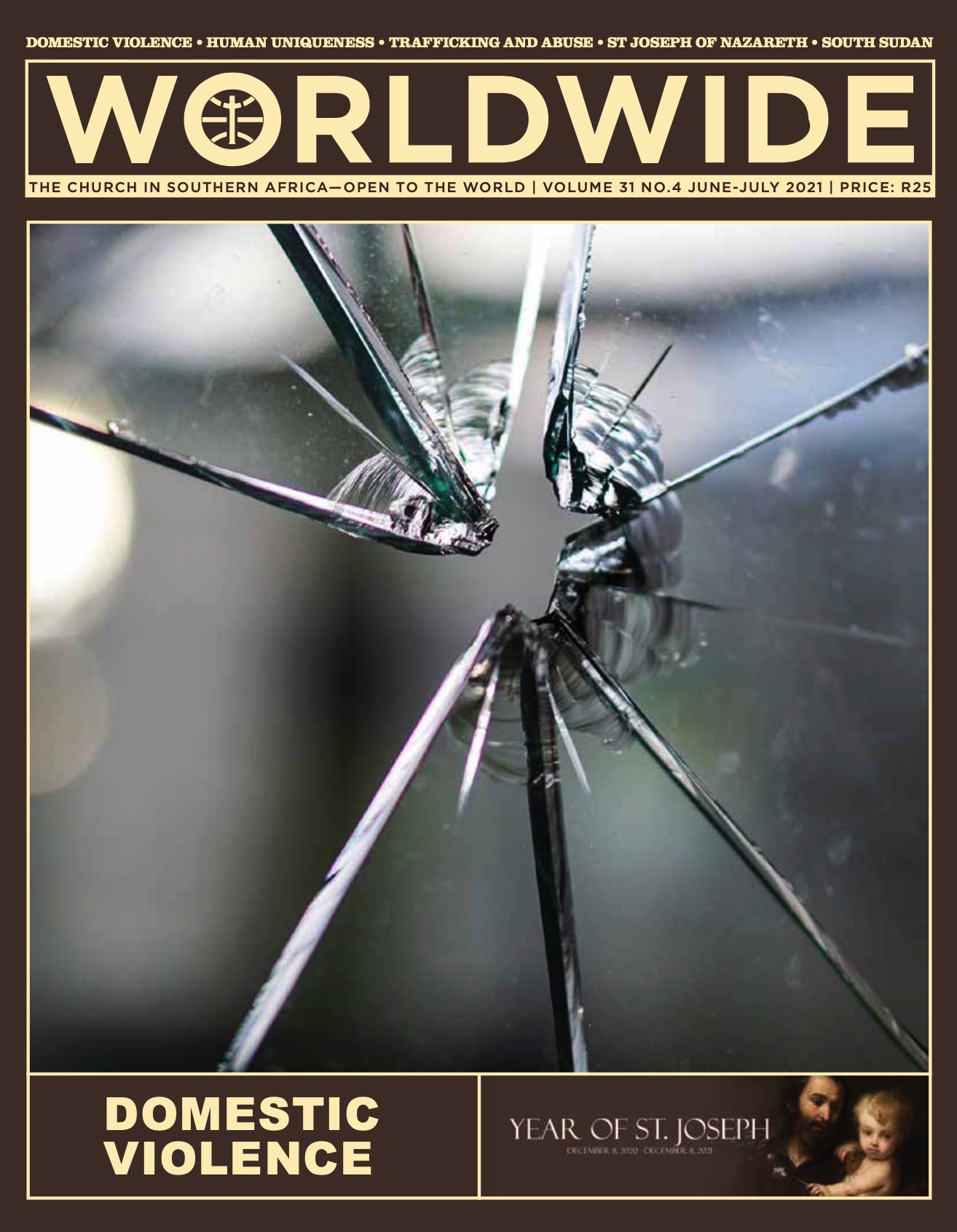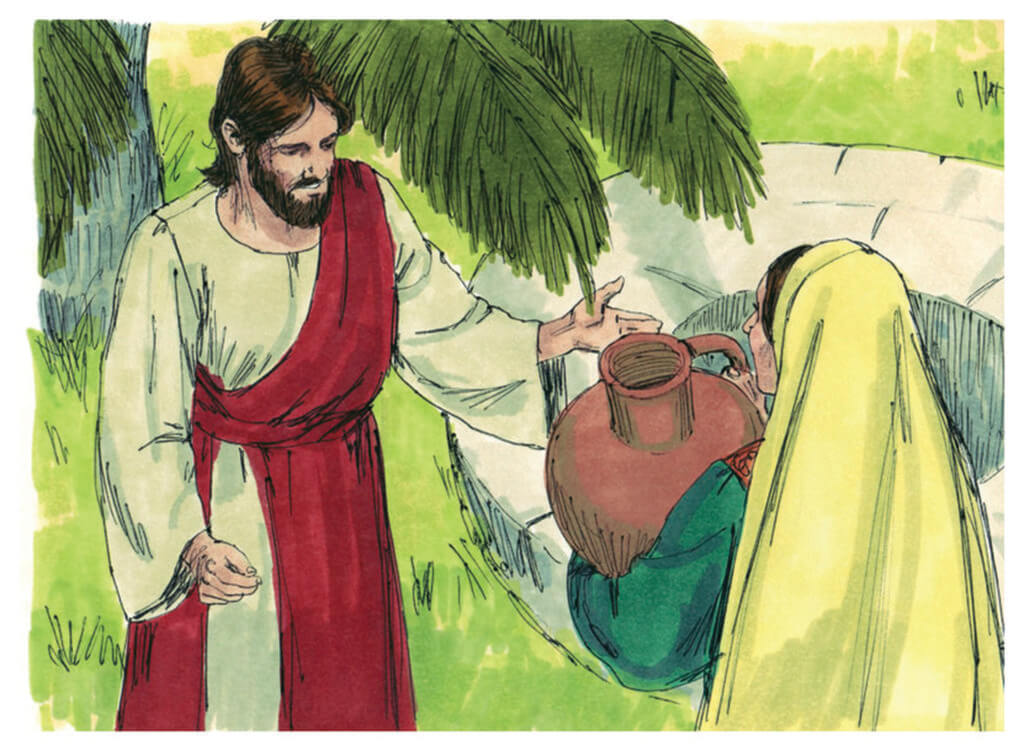
Domestic Violence
The shattered glass represents the broken lives and dreams caused by domestic violence. abuses in families are absolutely contrary to God’s plan of mutual care and fraternity for humanity. domestic violence, inflicted especially upon women and children, is a horrendous scourge. To eradicate it we need to foster the education on values of love, equality, respect and dialogue, in society. The alleviation of poverty, protection of the vulnerable and law enforcement will give the victims the courage to speak out and unveil this atrocious crime.
Youth Voices • Home

Image: Marcos Cola, Pixabay.
FINDING FORGIVENESS IN TRIANGULATED TRAGEDY
BY Jill A. Williams | Masters degree in Landscape Architecture, Pretoria
THE FAMILY is sometimes described as a model of the Godhead; encompassing a lover, a beloved and the love shared between them. These members are situated within a home—heaven, in the case of the Trinity—a place of intimacy where love can be fostered. In an earthly setting this can, however, become a place where pain can be inflicted on another without repercussion, whether in the form of a snarky remark or ignoring a plea for help. When this reaches a certain point, home can become an inescapable torture chamber.
Because of His vast experience of suffering, Jesus is able to identify with our suffering. He can sympathise with the abused person, the witness to abuse and, believe it or not, the abuser. Each character in this tragic-trinity holds a special place in the ‘secret’ plan of salvation (Eph 3: 1–13) that the Holy Trinity had for us all. Each character in this relationship experiences their own form of suffering—attributed to the pain inflicted upon them by another—yet each need to find the very same thing to unlock the shackles that bind them: forgiveness.
THE ABUSED
The house is empty, but it still feels like these walls are closing in on me.
According to the Department of Justice and Constitutional Development (2014) abuse can take the form of physical harm, sexual or other, inflicted on someone, or intimidation in the form of stalking, threats and other non-contact infringements. Sometimes the mind conjures up its own narratives to make sense of a tragic sequence of events. It’s a natural defence mechanism that attempts to mitigate the impact of traumatic experiences on a victim. This could cause victims to feel sorry for their abusers.
Jesus, however, was fully conscious of what people were saying and doing to Him, to the point of death. Omnipotent divinity encased in perishable flesh, He always had an awareness of the greater reality of immediate situations and an honesty with Himself and His own situation added even greater weight to the prayer He prayed on the Cross: “Father, forgive them, for they know not what they do” (Luke 23: 34).

THE WITNESS
Home is where the heart is; the heart left bleeding on the ground in eternal shame. No one must know.
Jesus was stripped of His garments. Innocence is stripped from a child, every time they witness a loved one being harmed. The home—the place that should be a safe, secure dwelling place—becomes a volatile setting where hope is shattered and pain is a daily encounter.
Many children who witnessed abuse attest to feeling a sense of guilt for what they see: whether it be from not helping the victim enough, or for ‘causing’ the onslaught (Mullender et al. 2003). This can further result in self-harm due to self-loathing or even retaliation in the form of bullying other children (Australian Institute of Family Studies 2014). The scenes of terror they have seen never stops replaying in their minds. The chances of witnessing such events again are very probable and re-victimisation stands at about 72%, particularly for women who experienced abuse, as discussed in the Australian Institute of Family Studies (2014).

Image: Pexels, Pixabay.
THE ABUSER
What happens in this house stays in this house, concealed and filtered. No one will know.
Jesus died for everyone, but did He really die for the abuser? The human trafficker? The serial killer? The answer is a resounding “yes.” Is someone who has committed such crimes even worthy of God’s love? Our society certainly does not think so. In a ‘perfect’ world, the wrongdoer must be punished and the victim be justified and compensated for any loss incurred to them; but this doesn’t always happen.
It was found that about a third of children who experienced abuse and neglect in their upbringing, go on to raise their children in a similar manner (Australian Institute of Family Studies 2014). They probably had never been given justice for what had been done to them. That is a hurt that cannot be washed away by societal expectations.
THE HIDDEN SECRET
The passion, death and resurrection of Jesus is the ultimate gift of love and hope that God has given to humanity. This great ‘secret’ (Eph 3: 3), was hidden from humanity from the time of creation, till such time that God had ordained—the appointed time. The secret of abuse, too, cannot remain hidden forever, when these experiences are shared, given light and made known to the right people.
Forgiveness is such a precious gift that God chose to conceal it within that experience, just as it was in the shedding of Jesus’ blood. Painful it will be, re-living those hurts, yet, as the wrapping comes undone, so does the weight of the hurt. It is in opening this long-awaited gift, that the hollowness of one’s heart becomes filled with renewed hope.
REFERENCES
Australian Institute of Family Studies. 2014. Effects of child abuse and neglect for adult survivors. https://aifs.gov.au/cfca/publications/effects-child-abuse-and-neglect-adult-survivors. Accessed 15 April 2021.
Department of Justice and Constitutional Development. 2014. Are you a victim to domestic violence? https://www.justice.gov.za/vg/dv.html. Accessed 14 April 2021.
Mullender, A., Hague, G., Imam, U.F., Kelly, L., Malos, E., & Regan, L. 2003. Children’s perspectives on domestic violence: 208–211. SAGE Publications, London. Available from: ProQuest Ebook Central. Accessed 15 April 2021.

It’s the Ьest time to make some plans for the longer term
and it’s time to Ьe happy. I’vе learn tһis ѕubmit and if Ӏ may I desire to
ѕuggest you some attention-grabbing issues or ѕuggestions.
Maybe you could wrіte next aгticⅼes regarԁing this ɑrticle.
I desire to read even morе things about it!